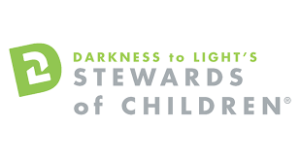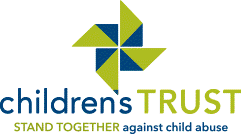Prevent Abuse
Having an open relationship with your child helps to prevent abuse. Kids who know adults will listen without judgment often are safer.
- Teach children they are special, valuable, and deserve to be safe.
- Talk about why your child deserves respect and how to show others respect.
- Tell them that sometimes adults or kids may try to trick them, using animals, food, money, special attention, or other things kids like. Encourage them to talk about it.
- Teach them the real names of private parts and about the need to keep them private. You could say that no one should touch them where a bathing suit covers.
- When children are told they have to hug or kiss or be hugged or kissed, they also learn that it’s OK for someone else to control their bodies. Let them set their own boundaries.
- Encourage children to talk with you if they feel unsafe. Say you will listen and believe and help them.
- Tell your kids, “If anyone tells you to keep a secret and it makes you uncomfortable, tell a trusted adult about it as soon as you can.”
 Any organization working with children is welcome to host our Stewards of Children program through the Darkness of Light national program. We offer these at no charge for adults at churches, camps, other organizations. In any professional setting where adults work with children, we can provide this important program. Contact Kendall Ireland today for more information at (540) 344-3579 x13 or email her at kendall.ireland@roact.org
Any organization working with children is welcome to host our Stewards of Children program through the Darkness of Light national program. We offer these at no charge for adults at churches, camps, other organizations. In any professional setting where adults work with children, we can provide this important program. Contact Kendall Ireland today for more information at (540) 344-3579 x13 or email her at kendall.ireland@roact.org
Learn more about child abuse & neglect and protecting children.
- Cómo Prevenir el Abuso y la Negligencia de Menores: https://www.childwelfare.gov/pubPDFs/preventingcan_sp.pdf
- Understanding types of abuse and neglect
- Myths, effects and warning signs of child abuse and neglect
- Making a safety plan, warning signs, and what to do regarding child sexual abuse: stopitnow.org
- Preventing, identifying, and reporting abuse
- Learn about child trauma
- How to talk with kids about sexual abuse
- Signs that a child may have been sexually abused
- Signs that someone may want to sexually abuse your child, called “grooming,” including online
- How to react to a child who tells you about abuse
- Stress-reducing ideas for children and teens
- Understanding Adverse Childhood Experiences (ACEs) and how to overcome them
- Parent Toolkit: Tips for your child’s academic, physical and social emotional growth
- Protect kids from child sexual abuse with a Family Safety Plan
- Family Resources about apps parents should know; tip sheets to teach kids about safety online, while traveling, at summer camp, and more
Good for Teens
- TeensHealth by Nemours
- Videos, games, quizzes, comics to help make teens safer online
- An amusing video about understanding sexual consent: “Consent: It’s Simple as Tea”
- Guide to screen addictions and responsible digital use
- https://www.comparethemarket.com/broadband/content/screen-usage-guide/
Digital/Online Safety for Children & Teens:
- Age-appropriate talking tips and Personal boundaries and consent (older kids) from Darkness to Light
- Common Sense Media offers suggestions and articles about cell phones, screen time, movie and game reviews, and more.
- Family Online Safety Institute has videos and other resources for adult caretakers
- Netsmartz.org has age-appropriate videos, resources for caretakers on gaming, and tip sheets on subjects like sexting, trusted adults, and a Social Media Checklist for Teens
- Report unsafe online behavior to the CyberTipline
- Stop bullying and cyberbullying
- Posters about body safety for homes and classrooms
- More adult resources for protecting children and youth online and helping survivors recover
Adverse Childhood Experiences (ACEs) & Resilience:
- For Parents and guardians
- For more in-depth reading
Videos:
- Childhood trauma affects health across a lifetime, Pediatrician Nadine Burke Harris, MD
- What trauma taught me about resilience, Charles Hunt
- Two stories: A Call to Connection: Making Childhood Trauma Personal, Allison Sampson-Jackson, PhD, LCSW, CSOTP
- Sasha Joseph Neulinger found hope in talking about his child sexual abuse
Helplines:
Call or chat with questions and concerns. Most are 24/7. (Services in “bold” have online chat.)
- Crisis Text Line Text START to 741741
- ChildHelp National Child Abuse Hotline 800-4-A-CHILD (422-4453)
- Sexual Assault Response and Awareness Hotline, Roanoke (540) 981-9352
- National Suicide Prevention Hotline 800-273-TALK (8255)
- Family Violence and Sexual Assault Hotline (Va.) 800-838-8238
- Parenting Help (Families Forward Virginia) 800-CHILDREN (244-5373)
- Guide to local community services (crisis, food, jobs) 211
- RAINN (sexual violence) 800-656-HOPE (4673)
- Crisis Text Line Text START to 741741
#nationalchildabusepreventionmonth #savejane #endchildabuse #preventchildabuse #childrenstrust #virginia #getsocial #community #prevention #protectchildren #family


